No products in the cart.
12 Tips for Hard Gainers to Increase Calorie Consumption

Being a hard gainer can be a bit of a nightmare, you’ve got an issue that 80% of your friends would give their left arm for.
It’s irritating because you’ll get it from both angles, half of the people you talk to will call you skinny and weak, while the other half will tell you how lucky you are and that they would kill for your metabolism.
But a problem is a problem, if you are a hard gainer and want to build mass, then you’ve got as much of an issue as an overweight person who wants to lose weight.
In this article, we will look at some helpful tips for hard gainers who want to increase muscle mass through diet.
We’re not going to go into exercise selection or training programs, because the truth is that getting your diet right is much more important.
So check out the following tips and try to apply it to your diet.
Tip #1: Measure Progress

One of the most frustrating things for hard gainers is the perceived lack of progress.
You’ll hear about no differences over periods of weeks. But if you are a hard gainer ask yourself this – have you actually taken any measurements? Or is this lack of progress down to a complete lack of assessment.
Your progress may not be going very fast, but if you are eating in a calorie surplus and exercising then you are scientifically guaranteed to build mass.
So measure it! Take measurements right now and write them down. Use a tape measure around your chest, neck, waist, hips, glutes, thighs, calves, arms, and forearms. Stand on a scale, take a “before” photo.
Save all of the figures (and keep that photo secure), then every week on the same day re-do them.
Do this week-in, week-out until you’ve been doing it for months. Then take a look back at your progress, you might be surprised by how far you’ve come.
Tip #2: Track Your Calories

Gaining weight or losing weight is all about energy balance.
Consume more calories than you burn and you will gain weight. This isn’t something that is up for debate, it’s just what happens.
So if you want to gain weight you need to ensure that you are eating enough to do so. It’s important to understand that us humans are terrible at estimating calories, absolutely atrocious.
So if you are serious about gaining weight you better get yourself a calorie tracking app, put your details in, follow the macro and calorie targets and be consistent.
If you’re not tracking then you’re either going to be in a negative energy balance (where you’ll lose weight) or you may be over-consuming and suddenly you’re fat!
Tip #3: Concentrate on High-Quality Foods
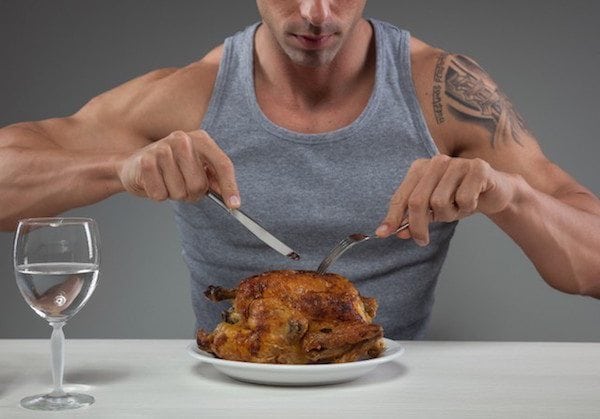
A lot of people think that bulking is all about setting yourself up at a booth at Burger King and not leaving until you’re swole. Sadly this is not the case.
You still have to consider your health, adequate protein (more on that later) and not over-consuming high fat or high sugar foods.
Sure, you can get away with a lot more than someone on a weight loss diet, but that’s no excuse to get sloppy.
As you track your calories you’ll get a good idea of what foods are taking you closer to your goals and which ones are taking you further away.
High protein chilli with lots of vegetables and some boiled rice is going to help you build mass.
A Double Down Burger from KFC may help you hit your protein targets but it’s going to push you well over your fat targets. It also has a low nutritional value – though on the plus side it is nutritionally dense, which may help those of you on the extreme end of skinny!
Tip #4: Hit Your Protein Target Every Day

When you’ve got your protein, fat, and carbohydrate goals you’ll start to realise that hitting all three exactly is almost impossible (unless you’re a complete food nerd).
Helms, Aragon, and Fitschen (2013) [1] found that the optimal macros for a natural lifter were 2.3-3.1g of protein per kg of lean body mass.
15-30% of your calories should come from fat, and the rest can come from carbohydrates. As you can see, it’s all a bit more flexible than you would have expected.
You should be concentrating on hitting your calorie target first, then worrying about your macros. Except for protein, because hitting your protein target every day is damn important.
Work out your LBM (body weight minus your body fat) and decide whether you want to do 2.3g or 3.1g per kg.
Once you have your target, make sure that you hit it daily.
Tip #5: Buy the Right Bulking Powders
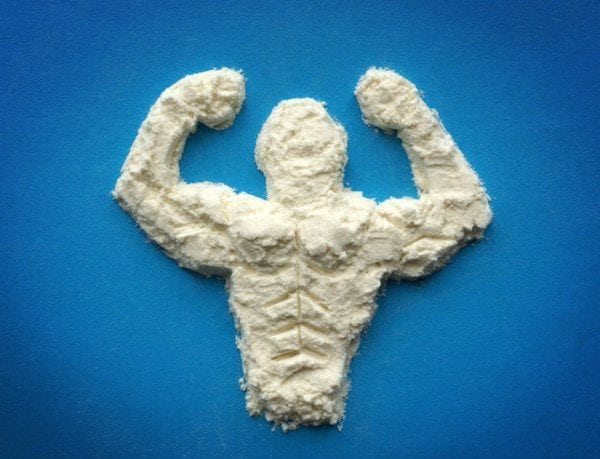
Bulking powders are very popular in the bodybuilding community, but are seen as extreme outside of it. But if you are a hard gainer then a high calorie bulking powder can really help you hit your goals.
The trick is to identify a good bulking powder and a bad one.
A good bulking powder will have a high protein content, a carb to protein ratio of 1:1, some fat (from excellent sources) and additional vitamins and minerals.
Find a bulking powder that suits your goals and your calorie target. If you are consistently 1500-2000 calories under your target then a higher calorie version would suit you best (they have a carb to protein ratio of 2:1 and are typically around 1,000-2,000 calories per serving.
If you are just looking to hit your targets and find yourself a little under, then a 300-500 calorie bulking powder is a better choice.
Tip #6: Identify Calorie Dense Foods
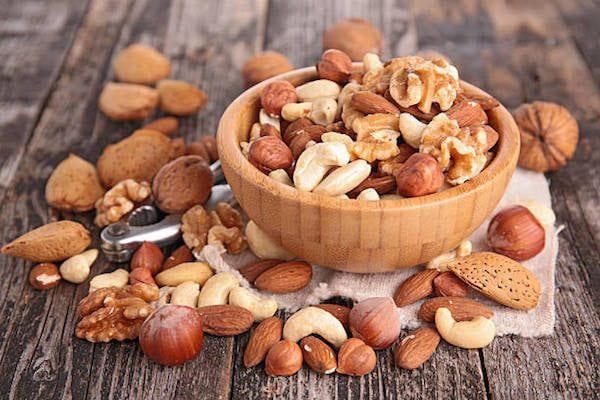
If you needed to eat another 1,000 calories before bedtime what would you go for, a bowl of spinach or a handful of salted nuts? Obviously the nuts right? That’s because they are calorie-dense, and are also hyper-palatable which means you would enjoy eating them.
A handful of salted peanuts can be up to 200 calories (depending on the size of the hand in question obviously).
This makes them great for hard gainers, but also a potential stumbling block.
You definitely don’t want to overdo foods such as peanut butter, olive oil, yoghurt, butter, and fried foods.
That’s why it is important to identify calorie-dense foods so that you know when to add them, and when to avoid them.
Tip #7: Schedule Your Meal Times
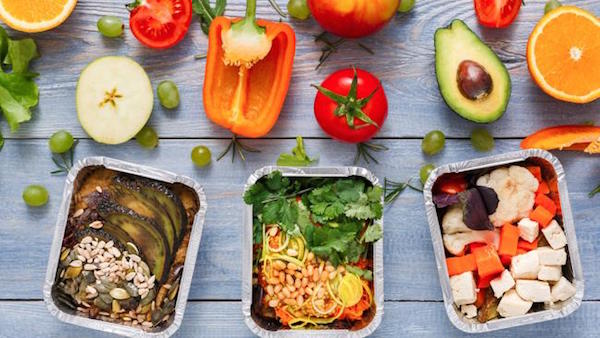
One of the biggest reasons why many people find it hard to gain weight is a lack of consistency (it’s also one of the biggest reasons why people fail to lose weight).
Most hard gainers say that they can eat whatever they like, but you’ll find that when they write down what they ate each day a lot of times they’ll have skipped breakfast, or stayed up till 4 am after last eating at 7 pm.
Scheduling your meals can really make a difference, firstly because it means you won’t miss any.
But it also helps you to identify meal times as a crucial part of your diet.
No more eating random snacks, no more last-minute microwave meal because you forgot to buy dinner.
Have your meals planned out in advance, cook the meals in bulk, freeze them, take them out and eat them.
Tip #8: Have a Pre-bed Snack
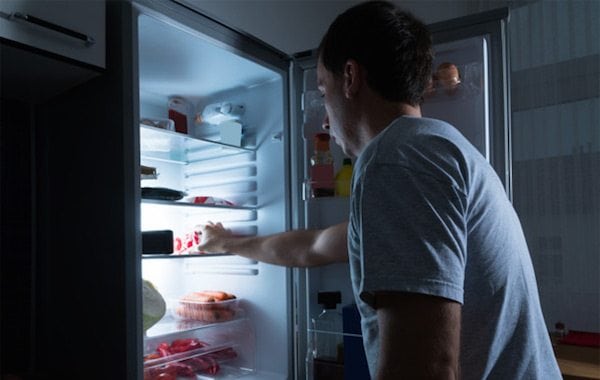
A well-chosen pre-bed snack will provide two benefits:
- It will increase your calories bringing you closer to your weight gain goals
- Certain meals can help improve your sleep quality
Foods such as cottage cheese, casein protein, Greek yoghurt, or just a glass of milk mixed with bulking powder can actually improve sleep quality, will increase your calories and will increase your protein. Perfect for recovering from a hard workout too!
Tip #9: Have Your Breakfast Ready The Night Before
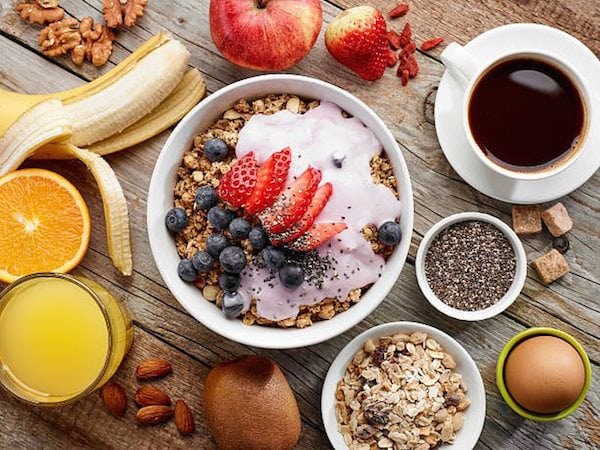
Most people skip breakfast because they don’t feel that they have enough time in the mornings to make themselves something.
Which is why preparing it the night before is such a good idea.
Now we’re not talking about frying an egg and leaving it to wait overnight.
But if you mixed together 3 eggs and placed them in the fridge they would be ready for making into an omelette the next day.
Have your coffee pre-made, bread in the toaster, fruit chopped up … you get the idea.
Tip #10: Weigh Your Food
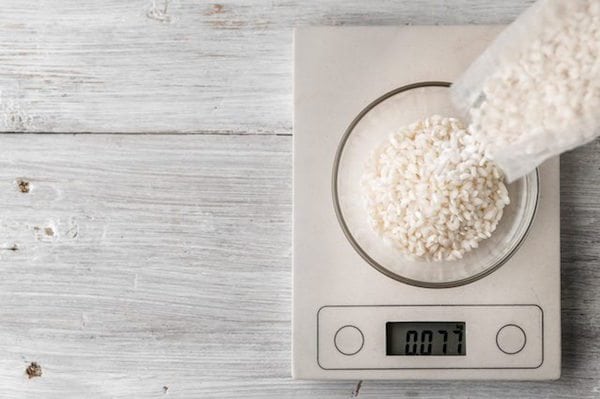
As we mentioned earlier, there are very few people on earth who are good at estimating calories, this goes double for portion sizes.
If you are supposed to be eating 2 servings of rice you are not going to be able to estimate this with your eyeballs, you need a set of scales.
If you want to really up your game you can separate a bag of pasta into smaller one-portion sizes. That way you can just grab a small bag each time you’re about to make a meal.
Tip #11: Don’t Just Mindlessly Eat
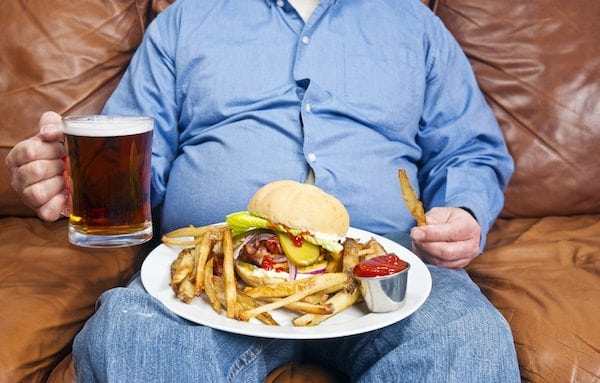
Just because you’re bulking doesn’t mean you have carte blanche to eat whatever and whenever you want!
We don’t want you ballooning up over a six week period because you fancied eating candy five times per day.
By all means, add in snacks that you love, just make sure that you are staying within your macro and calorie targets.
Tip #12: Treat Your Bulk like a Proper Diet

This final point is probably the most important one, when you are bulking you are dieting.
You are manipulating calories to achieve the desired body weight.
This is a diet, just because you are looking to gain weight doesn’t change anything.
Walk into this bulk with the exact same mindset as your overweight friend who wants to drop a jean size does.
Track, measure, work hard, be consistent, and choose foods that will help you rather than hinder you.
